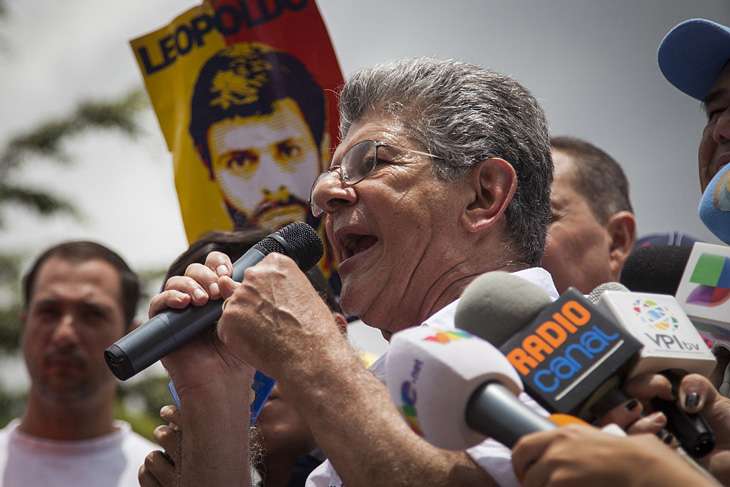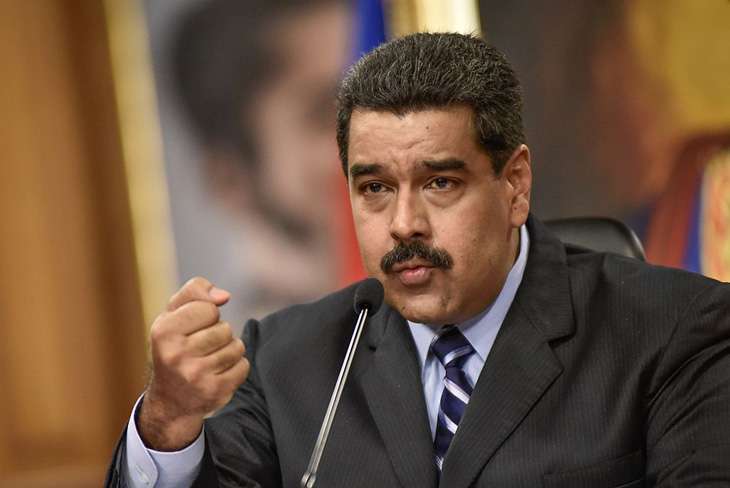Hunger, blackouts and extreme unrest: Huge crisis brewing in Venezuela

Venezuela has been simmering for a few years now. But over the past few weeks, things have taken a turn for the worse.
The growing economic crisis - fueled by low prices for oil, the country's main export; a drought that has crippled Venezuela's ability to generate hydroelectric power; and a long decline in manufacturing and agricultural production - has turned into an intensely political one for President Nicolas Maduro.
That's because Venezuelan Opposition leaders are rallying to hold a public referendum that would give Venezuelans the option to cut short 53-year-old Maduro's term, which ends in 2019.
Also read - Brazil's new cabinet is high on white men, low on sense
And a suffering population has risen and taken to the streets to make sure the country's socialist policies come to an end.
The looming collapse
It's not surprising that Venezuelans are frustrated. For a country with some of the richest natural resources in the world, Venezuela's economy shrank 5.7% in 2015 and is expected to contract an additional 8% this year, according to the International Monetary Fund.
That's because the government saved little money for hard times when oil prices were high. Now that prices have collapsed - they are around a third of what they were in 2014 - the consequences are casting a destructive shadow across the country.
The bolivar, the country's currency, is nearly worthless.
They're printing bills so fast in Venezuela you get the whole series in order now. pic.twitter.com/Is6Tx0X4la
— Nick Casey (@caseysjournal) May 28, 2016
While the official exchange rate is about 10 bolivars to the dollar, the black-market rate, which is regarded as more accurate, is about 1,100 bolivars to the dollar.
Inflation is expected to hit 720% this year, the highest in the world, thanks to the government's fantastic idea to raise wages and print more bolivars to soften the impact of inflation.
If that's not alarming enough, by some estimates, the inflation rate could reach nearly 1,600% in 2017.
To put the icing on the cake, the country owes roughly $120 billion to foreign creditors, and must make a payment of nearly $7 billion this year, most of it in the final quarter.
This has forced Maduro to sell Venezuela's gold to keep the country afloat. According to the IMF, the country's gold reserves have dropped almost a third over the past year.
Venezuela held biggest central bank gold sale in 8 years as economic crisis deepened.https://t.co/WP31BjxofN pic.twitter.com/3IYUXZHx6X
— Eddie van der Walt (@EdVanDerWalt) May 25, 2016
Welcome to Venezuela, the land of the hungry
Hunger is a part of daily life for most Venezuelans, now more so than ever before. Lines for food, long a feature of life in Venezuela, now erupt into looting. It's been documented that most stray dogs have disappeared off the streets and people are hunting pigeons. Milk, even in households that have babies, is a rare luxury.
On 16 May, Reuters reported how flour, chicken, shampoo and even underwear were stolen as the looting continued.
"Many people now get up in the dead of night to spend hours in long lines in front of supermarkets. But as more end up empty-handed and black market prices soar, plundering is rising in Venezuela, already one of the world's most violent countries," the report says.
The lack of food has had an alarming consequence - malnutrition is at an all-time high, with the majority of school children not receiving the recommended dose of nutrients for healthy growth and function.
The government, instead of claiming responsibility for the crisis, claims that a malicious right-wing elite is hiding food to stoke unrest.
Let Them Eat #Oil: #Venezuela’s #Food Crisis - @GroIntel https://t.co/p3MshwGUVe pic.twitter.com/C5dMAiCHjM
— Calestous Juma (@calestous) May 28, 2016
Water is also being rationed, and huge areas of the country are approaching the hottest months with little to almost no supply. And thanks to a lack of a basic commodity like sugar, the Venezuelan bottler of Coca-Cola has halted production entirely.
Plunged into darkness
To make matters worse, the government has taken what may be one of the most desperate measures ever by a country to save electricity: a shutdown of many of its offices for all but two half-days each week.
Then, on 22 April, the government announced that it would turn off electricity nationwide for four hours each day. This, in turn, has led to an increase in crime, and a deterioration of the already crumbling healthcare system.
The capital, Caracas, currently has one of the highest murder rates in the world. Vigilantism is replacing formal policing - there have been over 37 cases of mob lynchings reported so far this year in Venezuela.
Considering how useless the bolivar is at this point, even kidnappers are demanding ransoms in dollars.
Venezuela’s Economic Crisis Is So Bad, Kidnappers Demand Ransoms in Dollars https://t.co/rtRFpsRjfB pic.twitter.com/Gkfg0j3x1t
— War Is Boring (@warisboring) May 26, 2016
Failing healthcare
According to the Pharmaceutical Federation of Venezuela, the country is lacking roughly 80% of the basic medical supplies needed to treat its population. There's no electricity in hospitals, nor can one find gloves, syringes, or even soap.
Some hospital workers believe medicines are being swiped from their facilities to be sold on the black market.
And it's having a huge effect. People are dying across the country and others are being forced to take matters into their own hands. One, Jose Luis Vasquez, who was shot near his home by someone stealing his bike, has had to foot the bill for syringes, gauze and other necessities, and is currently using a water gallon as a makeshift surgical drain to draw fluid from his lungs.
In a piece titled 'Dying Infants and No Medicine: Inside Venezuela's Failing Hospitals', Nicholas Casey for the New York Times reports how there are at least seven newborn children dying each day.
Also, an estimated 400,000 people have contracted the Zika virus, and those numbers are steadily rising.
Between a rock and a hard place

Slowly but surely, Venezuela is inching closer to a complete shutdown.
On the political front, the government is finally paying the price for its chronic economic mismanagement. The Opposition coalition won an impressive majority in the National Assembly in last December's parliamentary elections.
Although Maduro has used his control of the judiciary and other institutions to resist attempts to curtail his power, even moderates within the Opposition (such as Henrique Capriles, two-time Presidential candidate and governor of Miranda) are advocating for the referendum or a constitutional amendment to remove him from office as soon as possible.
In fact, the Opposition submitted nearly two million signatures to kick off the recall referendum - way beyond the roughly 200,000 required.
A poll shows nearly 70% of Venezuelans agree and believe that Maduro must go this year. So far, protests have not broken out in full force, because the memory of the 2014 protests that left 43 people dead is still quite fresh.
Also read - Dilma Rousseff impeachment: Brazil threatens to descend into a disguised police state
Supporters of Bolivarian socialism or Chavismo, in turn, have accused the Opposition of orchestrating an "economic war", alongside foreign actors like the US, to plunge Venezuela into even deeper chaos.
At the centre of this situation is the state-owned oil company, Petroleos de Venezuela (PDVSA). Because no one in the international community has much reason to trust in Venezuela, the cash-desperate government has been issuing bonds through PDVSA in an attempt to obtain new funds at lower interest rates. By this point, however, the government has squeezed the company dry.
A ticking time bomb

For now, Maduro appears unwilling to step down under any circumstances. But one potential path forward could involve the resignation of Maduro and his replacement with a more competent and moderate Chavista, such as the Vice-President, Aristobulo Isturiz.
Paranoia has struck Maduro, a former bus driver and trade union leader, hard and he's threatened to seize private businesses to make them produce more. But so far, no businesses have been seized.
If violent social unrest breaks out, the military - which is still packed with Chavez loyalists - would need to play an increasingly influential role as arbiter.
Currently, one-third of the country's 28 ministers and half of the state governors are active or retired military personnel.
In fact, in a recent display to show the people who still holds the reins, Maduro reacted by declaring a state of emergency, his second this year, and ordered military exercises, citing foreign threats.
So just days after anti-government protesters clashed with police in multiple cities, Venezuela's military took part in a two-day exercise that was the largest such military drill in the country's history, with half a million soldiers taking part, according to AFP.
The legacy of Chavez
Many lay the blame for the crisis solely at the feet of Hugo Chavez, the president from 1999 till 2013, and his policies. Chavez, when he came to power, made his followers believe that his brand of Bolivarian socialism (Chavismo) was the road to dignity.
That was an easy sell, considering that Venezuela had till then always been a country of rich elites dominating the poorer masses without a fully-developed middle class. So in order to create an illusion of growth and inclusion, he channeled billions of dollars in oil revenues to the poor.
Chavez may have died in 2013, but economists say that his policies of state ownership, unfettered spending, subsidies and domestic price controls are more than just partly responsible for the crisis today.
Is there any solution?
The only way out for Venezuela will be economic reform. Yet, so far, the government has proved unable to take serious action.
"Venezuela doesn't just need some economic tinkering; it doesn't simply need reforms to its currency exchange rules. It needs a constitutional and republican political order; it needs democratic capitalism," writes Paul Bonicelli in Foreign Policy.
Because if you really think about it, had Venezuela had been run properly, it could've been richer than Saudi Arabia. Possibly.
More in Catch - How to lose friends and control opinion, Chinese govt style
Nepal headed for another showdown: Madhes agitation moves to Kathmandu
First published: 30 May 2016, 10:56 IST






![BJP's Kapil Mishra recreates Shankar Mahadevan’s ‘Breathless’ song to highlight Delhi pollution [WATCH] BJP's Kapil Mishra recreates Shankar Mahadevan’s ‘Breathless’ song to highlight Delhi pollution [WATCH]](https://images.catchnews.com/upload/2022/11/03/kapil-mishra_240884_300x172.png)

![Anupam Kher shares pictures of his toned body on 67th birthday [MUST SEE] Anupam Kher shares pictures of his toned body on 67th birthday [MUST SEE]](https://images.catchnews.com/upload/2022/03/07/Anupam_kher_231145_300x172.jpg)






